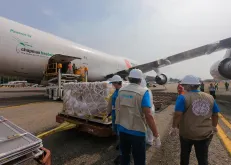When you walk into the UNICEF Logistic and Supplies Department in Venezuela the first thing you might notice is a wall decorated with a gigantic map of the country. There, you will probably see coloured pins and sticky notes. For a visitor, it might not make sense, but for UN Volunteers, this map is an inspiring tool to coordinate the distribution routes around the entire country.
With a presence in 190 countries, UNICEF continues its mandate on protecting children’s rights by being one of the leading UN agencies responding to the humanitarian crisis in Venezuela.
Amid the coronavirus pandemic, UNICEF Venezuela – along with UN sister agencies and public and private sector – elaborated a plan that identified the most at-risk communities. Some 189 health facilities, clinics and community health centres in 13 states have been reached among the country so far.
Currently, UNICEF has been providing health facilities with COVID-19 aid and serving children and women with education, nutrition and child protection services, including psychosocial support to children and their caregivers.
“The tremendous work UNICEF programmes coordinate locally is great,” said Rafael Vazquez, a UN Volunteer Specialist in Supplies and Logistics. “Planning all the little details to be able to coordinate something big, you know?"
Some of the programmes Rafael was referring to are the nutrition, health and water, sanitation and health (WASH) programmes. These programmes focus on the entire country, thanks to coordination with authorities and NGOs. UNICEF focused on providing children in the most vulnerable communities with sanitation/hygiene kits and training.
“Each programme coordinates its activities and partners,” said Amilcar, a UN Volunteer Specialist in Water, Sanitation, and Hygiene (WASH). “[Each programme] has identified the most vulnerable children, adolescents, and pregnant women [in the country].”
“[And] It is with the help of the programmes, which monitor and follow-up in their corresponding areas, that we [the Logistic and Supplies Department] coordinate the main routes,” added Rafael. “The programmes provide us with the data. We coordinate for different situations we might face, and we make sure that the supplies get to its destination no matter what.”
While Amilcar coordinates with partners to identify the most vulnerable communities and which supplies are the most needed, Rafael coordinates how to get the supplies to its destinations. Amilcar’s and Rafael’s work shows how UN Volunteers complement each other’s efforts.
These two departments contributed to equipped hospitals and outpatient clinics with supplies such as masks, gloves, gowns, antibacterial gel, liquid soap, sanitizers, spray and lab kits.
“We have distributed supplies here in Caracas, and trucks leave the warehouse weekly to the different areas,” said Amilcar.
Many supplies have a journey of their own before reaching its final stop, guaranteeing children’s rights. Rafael recounted the trajectory education kits must go before reaching a town in the border city of Maracaibo. Maracaibo, located in the Zulia state, is less than 75 miles from the Colombian border.
First, the education kits are loaded on a plane, then transferred to a truck. Later, they are reloaded to a small car, and finally, put on a bus to reach its destination.
The desire to serve their communities has been a big part of the lives of Amilcar and Rafael. Before becoming UN Volunteers, Amilcar used to work for a non-profit organization, where he supported people living in “ranchos” (shacks) move into cinder blockhouses, and Rafael used to work with Doctors without Borders’ logistics department. Their passion to serve vulnerable communities has been a driving force in their lives.
When asked how they guarantee that no one is left behind both UN Volunteers replied, “by identifying and serving the most vulnerable children… the furthest behind first.”
Now that they adapted to telecommute, they are serving tirelessly because in their words, "it is for the health, education, and well-being of children."
….Children who have been living amid a big humanitarian crisis in Latin American
.... Boys and girls who – despite everything – have a smile full of innocence and hope.
… Children who have “The right to health, to education, to protection, to tenderness, to life.” -Audrey Hepburn, UNICEF Goodwill Ambassador
This article was prepared with the kind support of Online Volunteer Nichool Castro.
Read more on Response for Venezuelans and on UNICEF's response in Venezuela.

